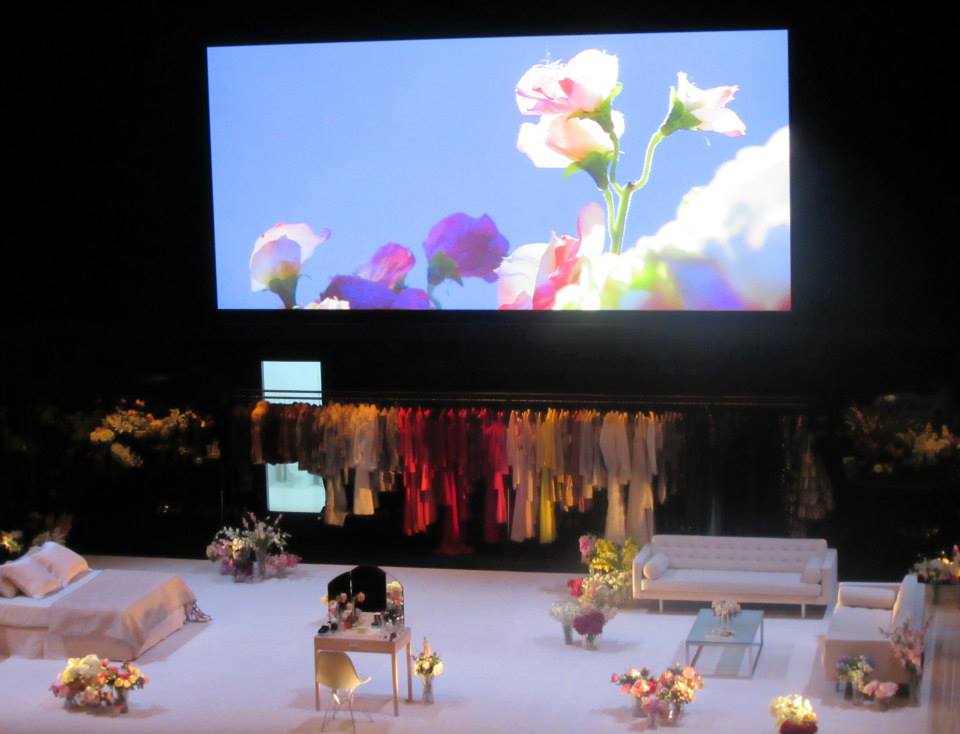From the moment I saw Alice Babidge’s design for Jean Genet’s THE MAIDS, I knew I would feel differently about this, the third Cate Blanchett import I have seen from the Sydney Theatre Company. It has the virtue of being spare and sumptuous at the same time and makes no distinction between costume and décor. The video screen tells us that the experience will be multimedia, and, along with the dresser mirror, glass walls and open bathroom, that it will be voyeuristic and self-reflective as well. It seems nearly impossible that an environment of such richness and potentiality would not, when peopled by a cast that includes Isabelle Huppert and Elizabeth Debicki in addition to Blanchett, catalyze a reaction of exceptional power. Add to that a subtly updated translation of one of the 20th century’s great works of trangressive literature and the sure-handed direction of Benedict Andrews, and what results is a far cry from the company’s Hedda Gabler, which did little more than display Blanchett’s considerable stage presence, or the messy provincialism of its Uncle Vanya, which pretty much engulfed the spidery brilliance of her performance.
This is, interestingly, accomplished in a production in which Blanchett herself does not particularly stand out. She is often, like French screen legend Huppert, more impactful in the simultaneous video than she is directly from the stage – not inappropriate given that Genet’s whole aesthetic is one of split personality and unsettled perspective. THE MAIDS was his take on the notorious case of the Papin sisters, who, in 1933, murdered their mistress and her daughter in a crime that included the gouging out of eyes and an incestuous lesbian relationship. For many French intellectuals, the murders were a manifestation of class struggle and its pathologies, but Genet, who was himself homosexual and in his youth a prostitute and petty thief, went further, making of it something approaching a celebration of moral transgression and the fantasies of desire. THE MAIDS is neither docudrama nor living newspaper, but a thorough transformation of events, in which the names are changed and a real murder may or may not occur.
There is, it must be said, a hint of creakiness in the equations that are drawn, as the recognition in contemporary culture of sexuality as an aspect of personhood makes it harder to associate lesbianism (although not, to be sure, incest) with criminality, violent or otherwise. But there is drama to be had here, and on the great playground of identity that is Genet’s stage, Blanchett and Huppert begin, as the sisters, playing the game with an odd combination of aplomb and bored resignation. You know they have done this a thousand times, and the great suspense is whether they will ever get around to killing their mistress for real, and if we will be there when they do so. This comes, admittedly, with a certain tedium, until: into the drama comes a whirlwind named Elizabeth Debicki, not the fading older mistress of the original, but spindly, young, and model-tall, spoiled rather than imperious, and campy as hell, a line of coke in the nostril of the play. The mood leaps in an instant from the interiority of the maids’ fantasy to the full-blown presence of their object of desire. You watch her, as the maids do, wanting her to stay but needing her to go away and never return.
It is an open question what THE MAIDS means now that the taboos of sex are not what they used to be. Maybe it is that wealth has a sort of eroticism that is accessible only to the privileged and their hangers on; or that simply being human, and experiencing the desires we do, is dangerous in itself, the distortions of the social order merely adding to the peril; the fantasy of killing and the charge that it gives to desire. That is the edge over which Debicki pushes the play when she enters, and on which Blanchett and Huppert teeter until the end.
THE MAIDS was presented at New York City Center by Lincoln Center Festival.
